Frequent questions - Academic certifications
The areas of knowledge for which you have been trained or in which you have recognized professional experience are shown by academic or professional credentials.
This information is complemented with the number of SPs (Skill Points) that reflect the level of training received, according to the number of courses taken, their duration and objectivity in evaluating achievement (visit Skill Points).
The academic credentials are core and complementary.
- Core: Scrum Master, Advanced Scrum Master* and AgiLevel.
- Complementary: the courses that incorporate these credentials are approved by Scrum Manager, who audits their quality on an ongoing basis. The complementary credentials available now:
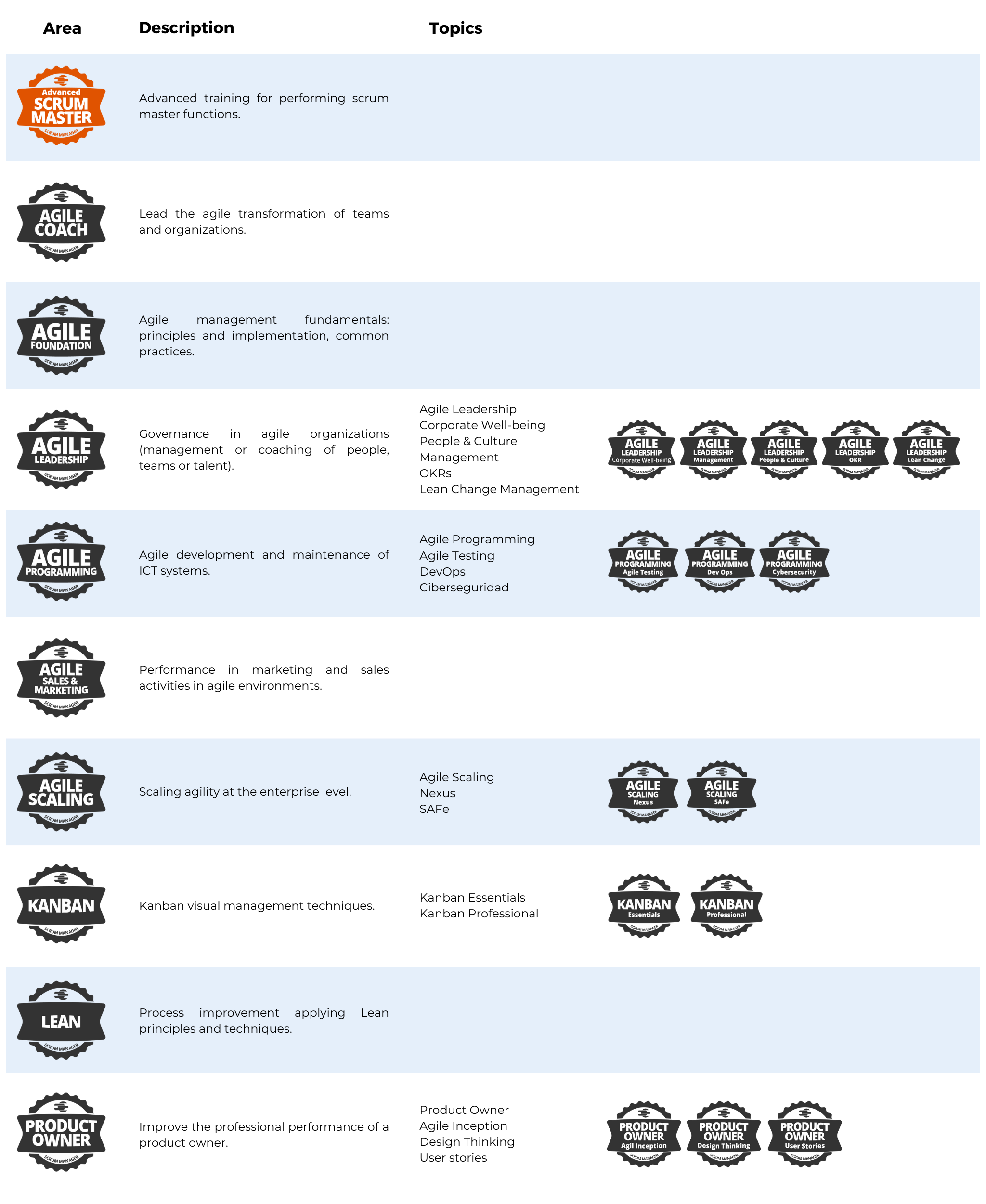
* Advanced Scrum Master includes training activities designed by trusted centers to provide continuity to the Scrum Master core without following a single syllabus.
For more information, visit Academic certifications.
To obtain a certification, you must contact an authorized Scrum Manager center. From the directory of centers, you can search for those that offer courses and/or exams in the subject in which you wish to certify.
For more information, see Academic Certifications.
The Agile Coaching academic certification is acquired passing the specific Agile Coaching course of an approved Scrum Manager center; or acquiring the Agile Coach professional certification.
Skill Points, or SPs, are used to indicate whether the holder of the credentials is continuing their education or is applying the knowledge acquired in their day-to-day life.
To this end, SPs decrease by 20% annually after the first year of obtaining them. That is: with the change from 2022 to 2023, the points obtained in 2022 are maintained; the points accumulated before 2022 are reduced by 20%.
They can be easily maintained with demonstrable training and professional activity.
Based on SPs (Skill Points), there are three levels of academic knowledge:
-
Technician < 100 SPs. It accredits the knowledge to carry out a professional performance in projects managed in a scrum framework.
-
Expert < 200 SPs. It accredits additional knowledge of flexibility in implementation and working with agile practices.
-
Authority => 200 SPs. It accredits advanced and specialized knowledge in agile management practices and frameworks proportional to the certified degree.
The maximum level of SPs visible on each user's personal profile is 350. If more are obtained, the system marks 350+.
For more information, visit Skill Points.
The Scrum Manager certification includes the number of Skill Points (SPs) that indicate the level of knowledge, either at the time of inquiry or at the time the certificate was printed.
This indicator reflects the loss and forgetting of acquired knowledge when not renewed or professionally employed. It experiences an annual decline of 20% if not professionally used or if no training activities are undertaken for its improvement or maintenance.
Activities that increase the level of SPs are:
- "Type A" training activities (with Scrum Manager certification). The core certifications (Scrum Master and Scrum Level) and complementary ones (Agile Coach, Agile Foundation, etc.).
- "Type B" training courses and activities (without Scrum Manager certification). These are complementary courses and training activities on agile project, people, or organization management.
- Professional performance. Professional involvement in agile project, team, or organization management annually contributes 40 SPs.
SPs can also be maintained by joining the Agile Club. It provides access to a repository of materials and resources, and provides community and support for professional development.
For more information, visit Skill Points.
The scale limit is 350 points and higher levels are not contemplated as they are outside the tabulation objective for professional categorization purposes.
For this reason, once the 350 authority points are exceeded, the academic information displayed does not go beyond 350+.
Internally, the system counts up to 400 SPs, so that in the event of exceeding the scale fund of 350, this level is not reduced by the 10% annual reduction process that reflects the obsolescence of non-updated knowledge, thus offering a sufficient margin of time to maintain the maximum level.
For more information, visit Skill Points.
The speed at which knowledge evolves quickly outpaces the knowledge acquired.
The Scrum Manager academic certification reflects this reality with a 20% annual decrease in Skill Points (SPs).
Thus, for example, the certification of 100 SPs maintains this level during the first year, and once this year has passed, from January of the following year it is updated to 80 SPs, and so on a recurring basis each year.
For more information, visit Skill Points (SPs).
If it's an academic certification, no. If it's professional, yes.
Academic Certifications do not expire. They are obtained after completing an academic training activity, meeting all of its objectives. Usually, this involves taking a final exam, although some activities are approved through projects or practical work.
After obtaining the credential, it appears on the user's Scrum Manager profile and is maintained indefinitely. But Skill Points will keep decreasing. Skill Points (SPs) decrease by 20% each year (after the first year of having obtained them) but can easily be renewed through demonstrable training and professional activity.
Professional Certifications must be renewed annually.
To do so, the holder must remain active with a high level of recognition, as reflected in the ratings received (>8).
For more information, visit:
Academic and professional certifications serve different purposes and, therefore, have different renewal requirements.
Academic certifications (orange and black badges) are awarded after a person has completed a course and / or passed an assessment. These certifications are now permanent because they reflect a specific educational achievement and accredit that at a certain point in time, the person acquired a particular level of knowledge.
On the other hand, professional certifications (blue badges) are awarded to validate that a person is actively practicing a specific role. These certifications require renewal because otherwise, there would be no transparency: a person may not practice the role represented by the certification for a lifetime.
For more information, visit Academic certifications
Of courses and exams*
Diploma of attendance
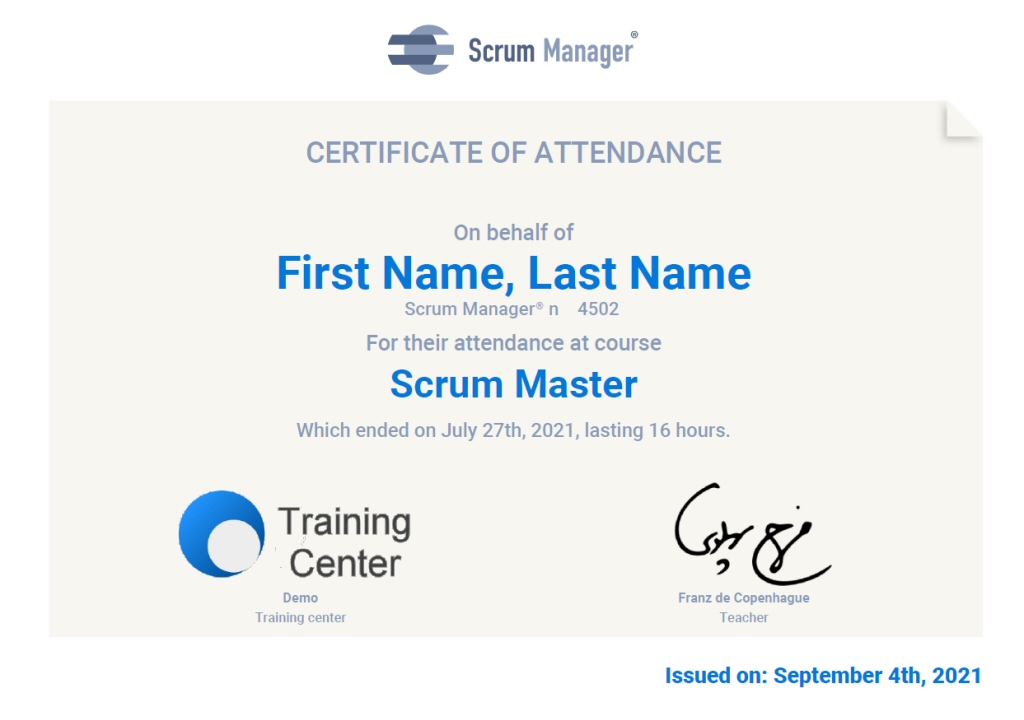
Academic certification diploma
This type of diploma corresponds to tests in which the identity of the student is verified and the completion of the exam or evaluation activities is supervised in person or by videoconference.
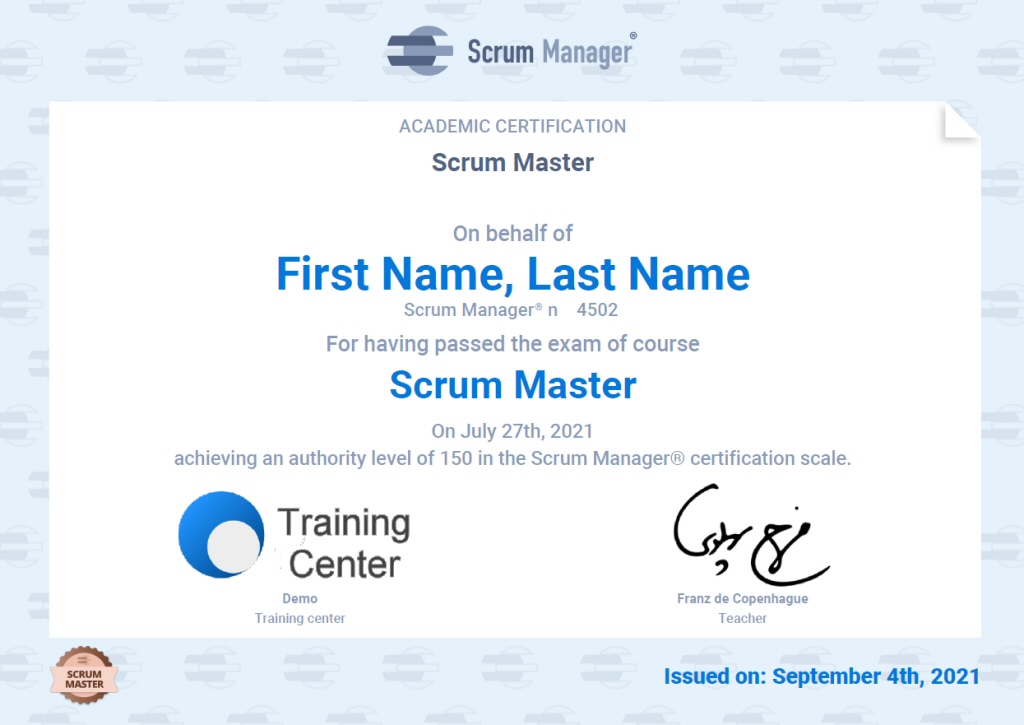
Complete information
General certificate
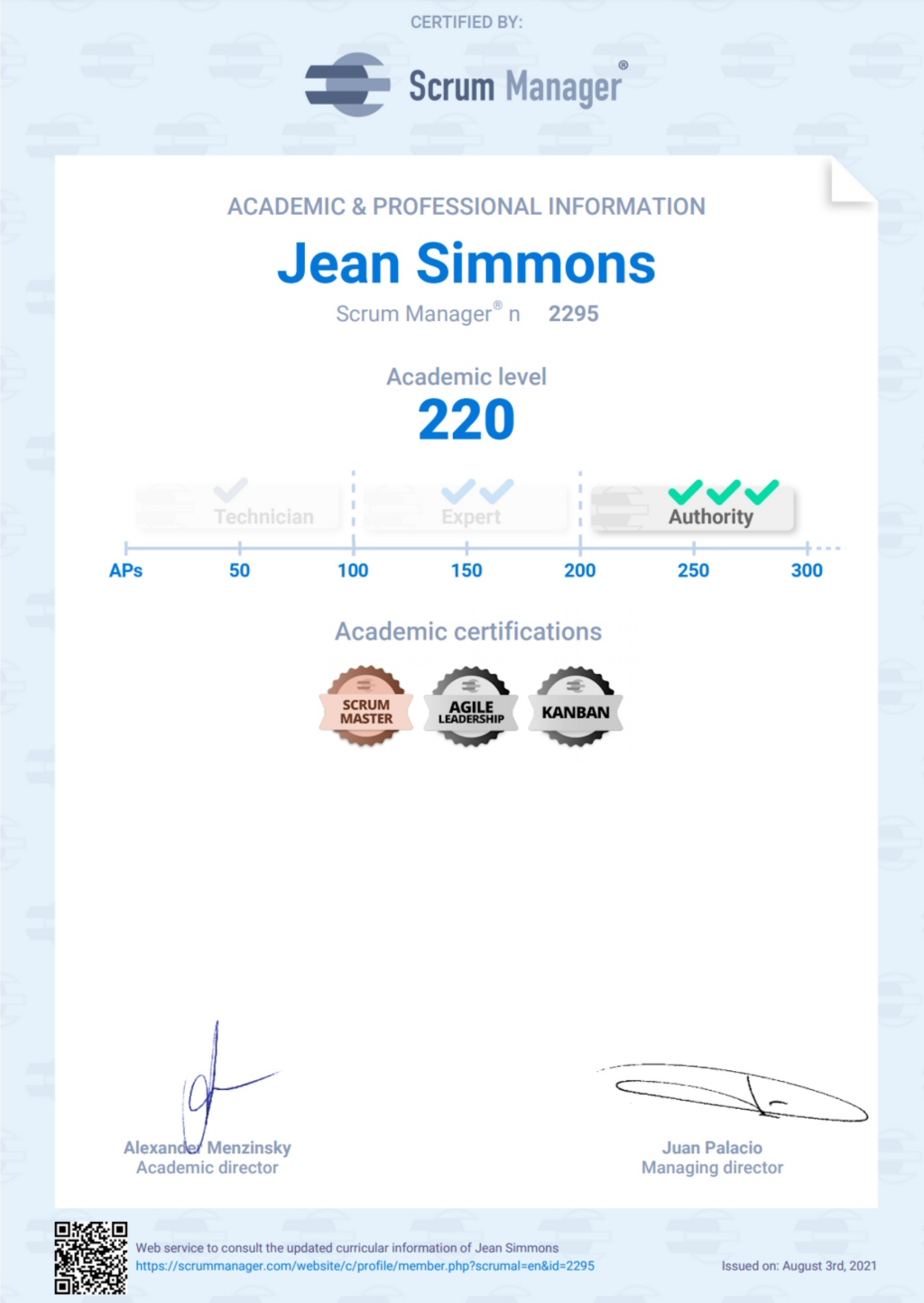
Grades certificate
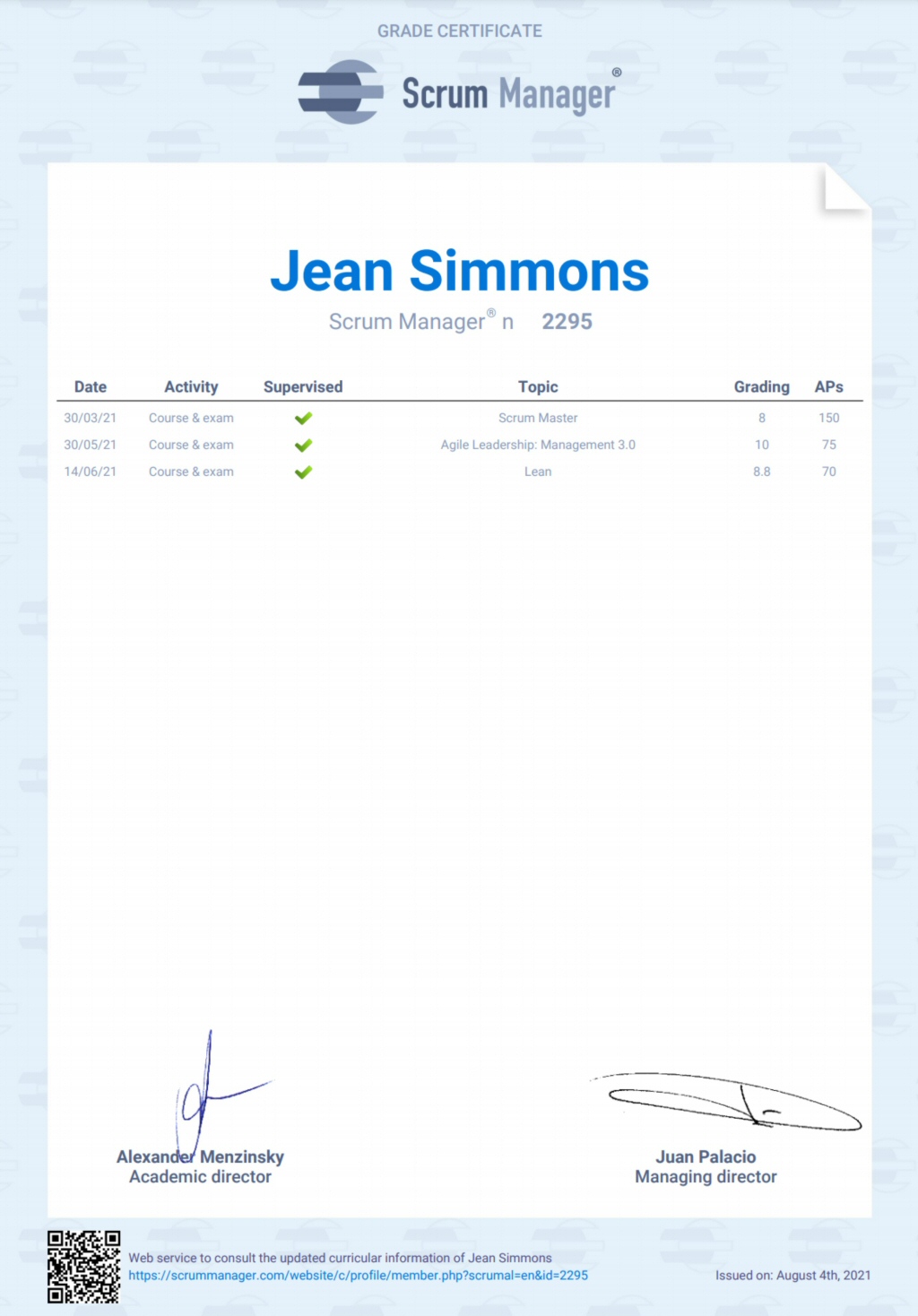
Accreditations were obtained by taking an official online exam, without student identification or supervision during the test. However, they are no longer available.
This change helps to avoid confusion with certification diplomas, which require a supervised exam and verification of the student's identity. These certificates can be obtained through authorized centers.
From the "Diplomas" section of the members area you can download the Scrum Manger certification certificate, and also the diplomas of the courses taken, with the number of SPs of each course, or the certification of attendance if you had not completed the exam, or you would not have passed it.
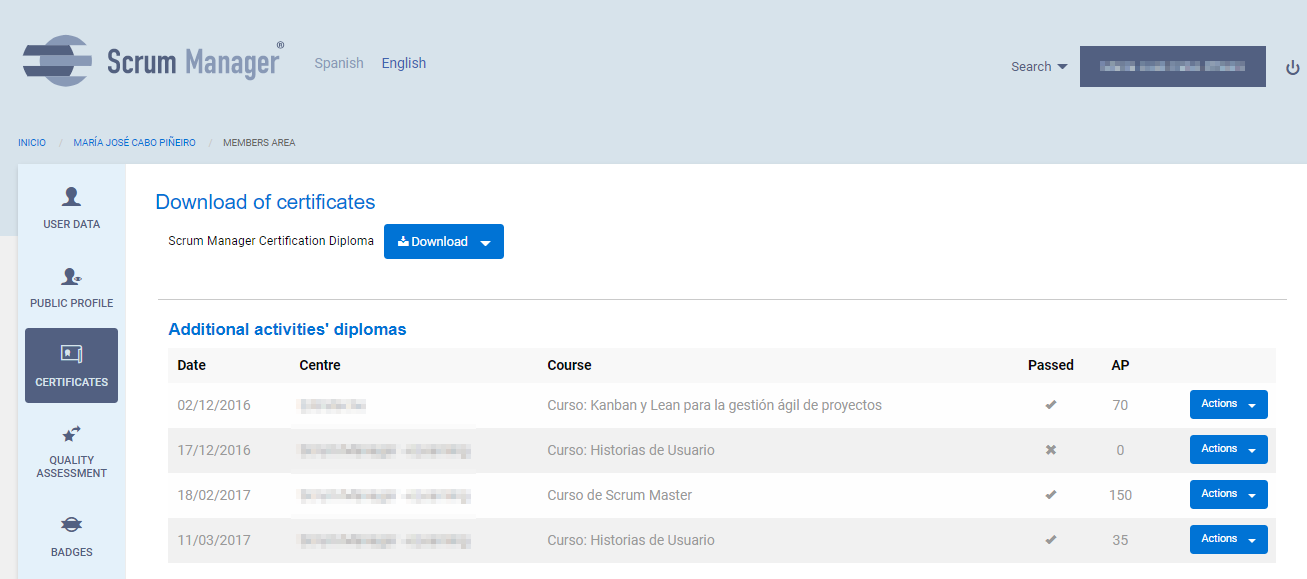
In order to add your certification to LinkedIn, select "Add certification" when editing your profile and enter the following information:
- Certification name: Scrum Manager.
- Certification authority: Scrum Manager.
- License number: the number on your certificate.
Scrum Manager’s certification keeps the amount of Skill Points and certified fields of knowledge for each student updated on their professional profile. Keeping this in mind, enter the following information on the remaining fields:
- Time period: from your registration date on Scrum Manager.
- Mark “This certification does not expire".
- Certification URL: URL of your professional profile at scrummanager.com.
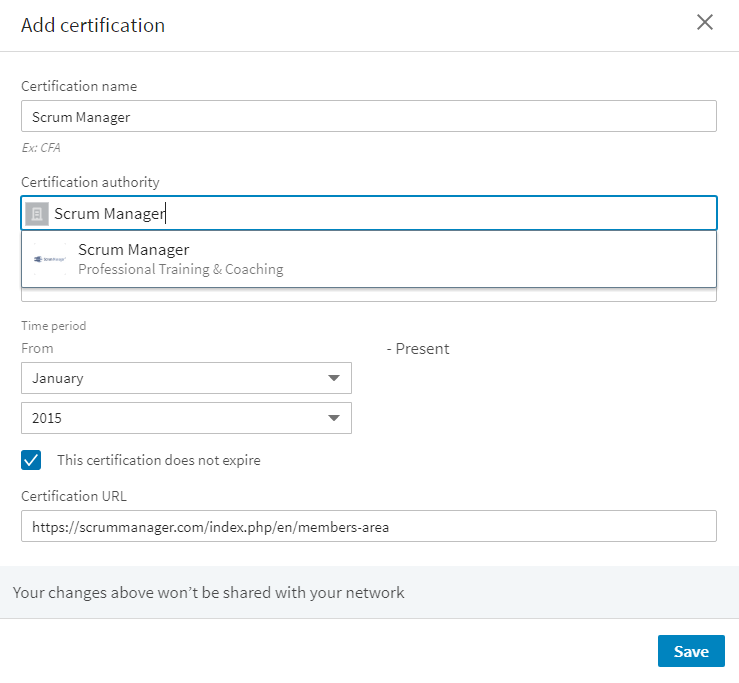
They are multiple-choice exams.
- The Scrum Master exam:
- Consist of 55 questions.
- The time to complete it is 60 minutes.
- The AgiLevel exam:
- Consist of 30 questions.
- The time to complete it is 45 minutes.
You can take the official exam to get certified by searching the directory of centers that offer Scrum Master or AgiLevel exams. The directory allows filtering by country, type of activity (course and exam or exam only), mode (in-person or online with web supervision), and language.
You can prepare for the exam before getting certified. There are two ways to do it:
- Training questions.
- In the e-learning classrooms available with the Agile Club membership.
In both cases:
- The exams accessed are created from the same question bank as the official certification exams.
- The test is not supervised, and therefore no certificate is awarded; for that, it is necessary to go to an official center.
Training Questions
As a Scrum Manager user, you have access to training questions.
They can be found within User Profile > "Academic Certifications" > "If you are going to take or renew the validity of a core certification, you can practice training questions by clicking here."
In Scrum Manager, skills encompass knowledge external to agility, but that complete the professional profile of those who work in agile environments. In other words: cross-disciplinary knowledge, but not fundamental.
They appear as informative labels (hence skill “tags”) on the professional profile of the certified user after completing training in these areas. There is a specific section for them both in the online profile and in the general level certificate. As a user, you can download this certificate from your Personal Area, under “Certificates”.
The following skill tags are currently available:
-
AI for agile projects: knowledge about artificial intelligence applied to agile projects, aligned with the principles and values of agility.
-
Prompt engineering: knowledge of effective communication applied to the creation of prompts.
Do the skills grant SPs?
Yes: just like other credentials, if the training is completed and the requirements are met under supervision, SPs are added to the user’s profile.
Exception: if the same training is repeated within a short period of time.
It is a skill tag that certifies professional, up-to-date, and applicable knowledge of AI integrated with agile frameworks and aligned with the principles and values of agility. This credential complements the curricular information in Scrum Manager’s certification framework.
It is aimed at organizations that require verifiable evidence of AI-assisted agile management, and at product, project management, engineering, data, UX, marketing, and operations professionals who work with agile teams and AI-connected tools.
What does it certify?
It certifies that the holder:
-
Understand and apply AI tools to support planning, data analysis, and decision-making in agile projects.
-
Integrate AI into product management, for example in the prioritization, refinement, and validation of backlog items.
-
Use AI as support for team collaboration and communication, facilitating the generation and synthesis of relevant information for different stakeholders.
-
Analyze team performance data with AI to identify patterns, bottlenecks, and opportunities for improvement in agile processes.
-
Process and analyze user and customer feedback with AI to extract relevant insights that support decision-making and continuous product improvement.
-
Leverage AI to improve quality and risk management by applying it to validation activities, testing, and early problem detection.
Does it need renewal?
Given the fast-paced evolution of prompt engineering and LLMs, this skill tag is valid for one year from the date of issuance. After one year, revalidation may be required.
It is a skill tag that certifies professional, up-to-date, and applicable knowledge of prompt engineering practices for language models (LLMs) and multimodal experiences. This credential complements the curricular information in Scrum Manager’s certification framework.
It is aimed at professionals in product, data, engineering, UX, marketing, and operations, as well as teaching and agile consulting, for whom verifiable evidence of competence in applied prompt engineering is valuable.
What does it certify?
It certifies that the holder:
- Understand the structure and fundamentals of a prompt, including the elements that influence the model’s behavior and its responses.
- Apply prompting patterns and strategies to effectively address different types of tasks and contexts.
- Design prompts to obtain structured outputs or integrate with other tools, while understanding the conceptual foundations of interaction with external systems.
- Apply best practices to ensure the quality and reliability of responses, including the use of contextual information and the reduction of errors or hallucinations.
- Identify and manage risks associated with prompting by applying security criteria and mitigating vulnerabilities.
- Evaluate the effectiveness of prompts and gain a general understanding of how advanced systems based on agents or multiple models can be coordinated.
Does it need renewal?
Given the fast-paced evolution of prompt engineering and LLMs, it is valid for one year from the date of issuance. After one year, revalidation may be required.
It’s a skill tag that certifies professional, up-to-date, and applicable knowledge in designing, operating, and improving OKRs (Objectives & Key Results) for teams, products, and organizations. This credential complements the curriculum information within the Scrum Manager certification framework.
It is aimed at professionals in product, strategy, data, engineering, UX, marketing, and operations, as well as agile teaching and consulting, for whom verifiable evidence of practical OKR competence is valuable.
What does it certify?
It certifies that the holder can:
-
Understand OKR fundamentals and their relationship with metrics, KPIs, and agile frameworks.
-
Write clear, inspiring Objectives and measurable Key Results oriented to outcomes.
-
Distinguish outputs from outcomes and select suitable leading and lagging metrics, establishing baselines and targets.
-
Design and run effective cadences (annual/quarterly), including check-ins, 0–1 scoring, and confidence levels.
-
Align OKRs vertically and laterally (team–product–organization), connecting them to the North Star Metric and guardrails.
-
Integrate OKRs with agile execution (roadmap, quarterly planning, sprint goals) without turning KRs into task lists.
-
Detect and correct common antipatterns (too many OKRs, vanity or activity-based KRs, metric gaming, rigid cascades, lack of data).
-
Evaluate progress with reliable data and make learning-oriented decisions (experiments, pivots, reasonable stretch).
Does it need renewal?
Given the pace of change in product management practices and metrics, it is valid for one year from the date of issuance. After that period, revalidation may be required to ensure skills remain current.
It’s a skill tag that certifies professional, up-to-date, and applicable knowledge in the design, writing, and operation of user stories for teams, products, and organizations. This credential complements the curriculum information within the Scrum Manager certification framework.
It is aimed at professionals in product, UX/UI, engineering, QA, data, marketing, and operations, as well as agile teaching and consulting, for whom verifiable evidence of practical competence in User Stories is valuable.
What does it certify?
It certifies that the holder can:
-
Understand the fundamentals: origin in XP, adoption in Scrum, stories as value hypotheses oriented to outcomes, and their relationship with OKRs/KPIs.
-
Write high-quality stories: apply the classic pattern “As a [role], I want [goal], so that [benefit]” and the Job Stories alternative (when to use each); use relevant User Personas.
-
Define verifiable acceptance criteria: Given/When/Then format and connection to QA/testing and the Definition of Done.
-
Apply INVEST: detect “smells” (tasks disguised as stories, missing user/benefit, non-testable stories) and rewrite to meet Independent, Negotiable, Valuable, Estimable, Small, Testable.
-
Split (story slicing) into vertical increments: deliver end-to-end learning/value; distinguish horizontal vs. vertical slices and employ practical slicing strategies.
-
Prioritize and estimate: use relative estimation (Planning Poker, sizes/Fibonacci) and prioritization techniques (MoSCoW, simple ROI, WSJF), focusing on outcome impact (conversion, retention, efficiency, NPS).
-
Manage essential and extended information: description, value, estimate, and priority; plus dependencies, risks, NFRs (performance, security, accessibility), DoR/DoD, and links to metrics.
-
Integrate with agile execution: backlog refinement, sprint planning, coherence with epics/themes/roadmap, and traceability to product objectives.
-
Detect and correct antipatterns: oversized stories, activity/output-based stories, rigid cascades, gaming of criteria, lack of data/benefit, and refinement debt.
Given the pace of change in product management practices and the need for current evidence, it is valid for one year from the date of issuance. After that period, revalidation may be required to ensure skills remain up to date.